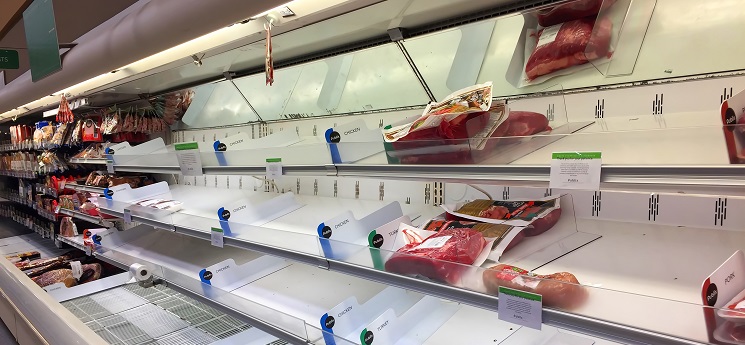Fears that consumers could be confronted by empty shelves at supermarkets due to staff restrictions at warehouses and distribution centres are being discussed by government and industry leaders.
And the Coles CEO has warned of possible “patchy availability” of some products and flagged potential issues with meat supplies, with abattoirs and meat processing facilities having to reduce their workforces.
As part of the Victorian lockdown, warehouses and distribution centres have been told to reduce staff by 33 per cent from Saturday. This has now been pushed back to Sunday with high-level talks taking place.
Australian Logistics Council chief executive Kirk Coningham told the Australian Financial Review that supply chains would not be able to keep up with demand if they were forced to reduce staff.
“A 30 per cent reduction in distribution centres and warehouses will equate to about a 30 per cent reduction in our capacity to put stuff on shelves in supermarkets,” Mr Coningham said. “We’re at about 40 per cent extra demand right now in Victoria, right now in Melbourne, for supermarkets.”
He said that Woolworths had four distribution centres in Melbourne, including a national centre in Mulgrave.
The issues arising from the six-week stage four lockdown were quickly raised with government officials on Wednesday night and federal transport minister Michael McCormack also weighed in, saying the government needed to ensure trucks carrying essential supplies stayed on the road.
Business Council of Australia (BCA) chief Jennifer Westacott said there were serious problems with restrictions in Victoria and that it was ready to work with governments to keep Australians safe, save jobs and ensure people could access the products they needed.
Coles CEO Steven Cain told Triple M this morning that its supply chain for food would be able to weather Victoria’s lockdown but raised concerns about meat stocks with abattoirs affected by staffing and operational restrictions.
“The governments, state and federal, have been very helpful in keeping borders open for freight,” Mr Cain said.
“As we said before, there’s no problem with food supply in Australia, we’re pretty self-sufficient.
“As I said, there will be some patchy availability from time to time, there might be the odd night of the week where we all have to try a vegetarian dish, or might need to try a meat cut that they don’t normally try.”
At his daily briefing, Victorian Premier Daniel Andrews said there had been 471 new cases and eight more deaths in the previous 24 hours, down from 725 new cases and 15 deaths the previous day.
He said supermarkets, warehouses and distribution centres had been given an extension until midnight on Sunday to try to meet the Victorian regulations.
“The important thing is they will reduce, particularly for supermarkets, their overall workforce across distribution and, indeed, across their entire functions, so all the way across their business they’ll bring those numbers down to that two-thirds level,” he said.
He also elaborated on the rules for meat suppliers. Victorian beef, lamb and pork processors must reduce their capacity by a third and chicken processors by 20 per cent, but only if a plant has fewer than 25 staff.
“All these measures are designed to drive down to the lowest numbers of workers we can practically get to without at the same time delivering a shortage of products,” he said.
Do you support the Victorian government’s strict lockdown measures?
If you enjoy our content, don’t keep it to yourself. Share our free eNews with your friends and encourage them to sign up.
Related articles:
https://www.yourlifechoices.com.au/health/covid19/symptoms-predict-covid-seriousness
https://www.yourlifechoices.com.au/health/covid19/tough-new-penalties-for-covid-breaches
https://www.yourlifechoices.com.au/health/your-health/good-health-may-just-mean-moving-more

